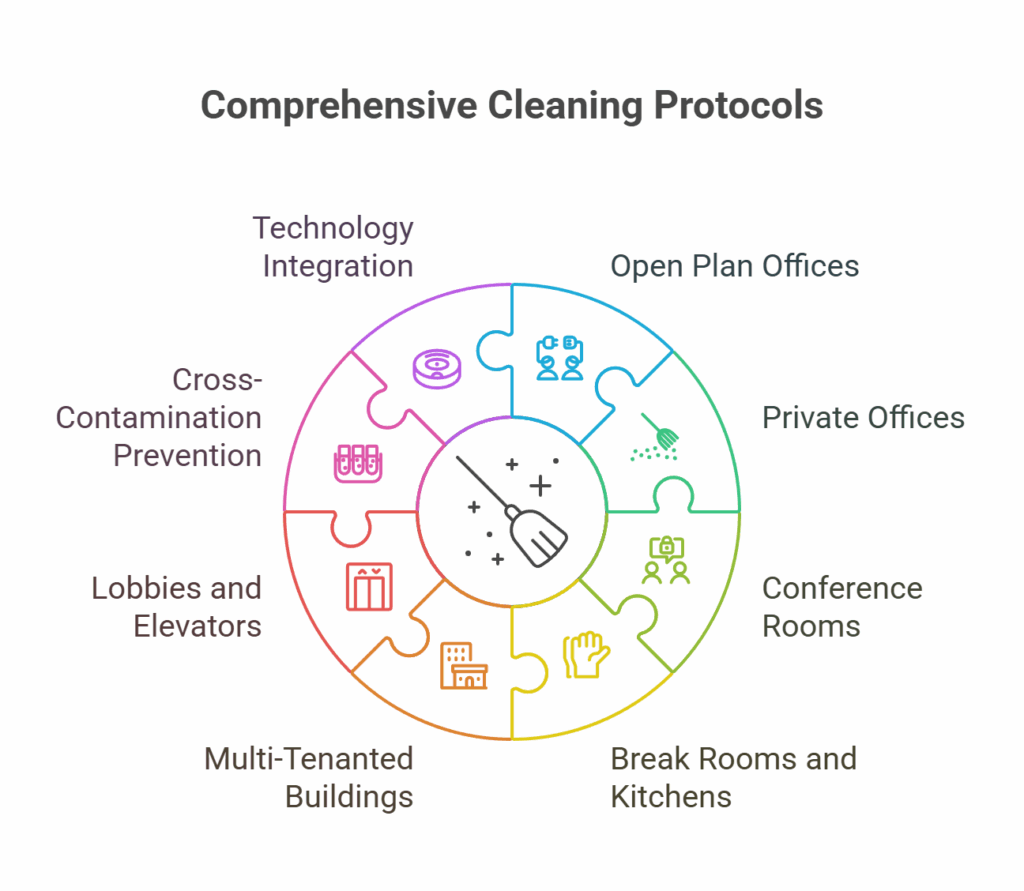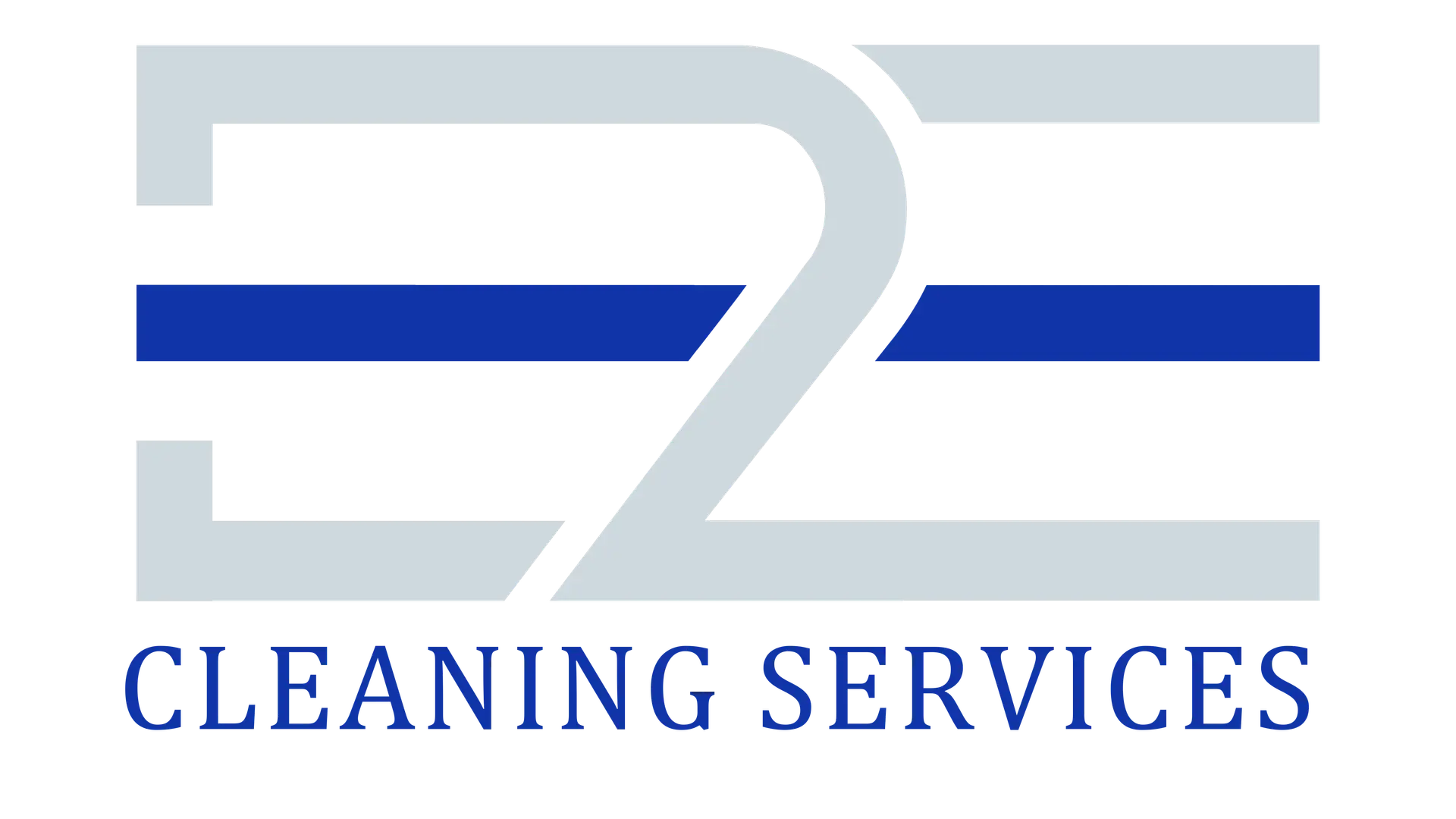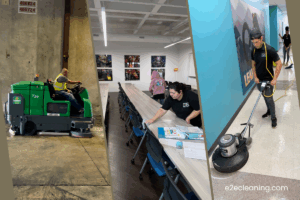The modern workplace conditions require advanced cleaning procedures that are health-conscious, meet regulations , and enhance operational efficiency.
Florida business face unique daily challenges including humid conditions that promote bacterial growth, strict state regulations, and diverse workplace designs that range between conventional offices and hybrid ones. This leads to specific cleaning challenges for businesses.
We’ll explore key professional cleaning standards, detail protocols for diverse workplace settings, and present implementation strategies that address both thorough sanitation and business operational needs.
Why Modern Standards Matter
As workplace expectations have evolved beyond aesthetics, professional standards of cleanliness have become essential.
Florida Businesses are required to meet Occupational Safety and Health Administration (OSHA) standards for workpalce cleanliness. Professional cleaning services help ensure compliance and avoid potential fines, which can result in fines of up to $14,000 per violation for inadequate facility maintenance.
Recent 2025 OSHA developments include new PPE fit requirements and proposed heat safety standards, increasing workplace compliance complexity.
Cleaning properly has a direct effect on the performance of the business in measurable ways. Studies have shown that clean environments lead to:
- Reduced absenteeism among employees due to workplace illnesses
- Increased concentration and efficiency when workspaces are well-maintained
- Increased satisfaction and retention of employees overall
- Good first impressions on clients and visitors
In addition to operational benefits, professional cleaning standards provide critical liability protection. Keeping records of cleaning procedures is a good example of how to show due diligence in providing safe working conditions. Such records become especially valuable in the context of health inspections or in the context of employee complaints about workplace conditions.
The commercial cleaning industry is still growing significantly, with the global market expected to reach $415.93 billion in 2025 and grow at an annual rate of 7.19% through 2032. North America holds the largest revenue share of 37.65 % , indicating the increased focus that businesses have on professional cleaning services.
The implementation of professional standards requires documentations, including:
- Written cleaning protocols for each area in the facility
- Chemical safety data sheets and storage procedures
- Cleaning-related incident emergency response plans
- Evidence of staff competency training records
Protocols for Diverse Spaces

Different workplace settings require different cleaning procedures, taking into consideration the function of the area, the amount of traffic, and the materials used. In open plan offices, for example, it is necessary to sanitize shared surfaces and equipment frequently, while in private offices, it is possible to follow other schedules based on occupancy patterns.
Conference rooms and meeting spaces deserve special consideration because they are multi-user spaces:
- Cleaning of tables, chairs and presentation equipment after each meeting
- Particular focus is put on remote controls, markers, and technology that is shared
- Control of air quality by proper ventilation and filtration
- Deep cleaning of carpets and upholstery on a regular basis
Break rooms and kitchens are different:
- Food safe cleaning of countertops and appliances
- Deep cleaning of refrigerators and microwaves on a regular basis
- Proper management of waste to avoid pest infestation
- Disinfection of high-touch surfaces such as coffee machines and water dispensers on a daily basis
Multi-tenanted buildings need to be managed in a way that balances the needs of the common areas with the needs of the individual tenants.
Lobbies and elevators, because of the high foot traffic of a wide variety of users, tend to require more frequent attention. Property managers need to define clear lines of responsibility between building maintenance and tenant specific cleaning responsibilities.
Prevention of cross-contamination has become a key concern in the case of shared spaces by:
- Colour-coded cleaning equipment that prevents the cross-contamination of areas
- Microfiber technology that captures and not disperses particulates
- HEPA filtration in vacuum systems to prevent recirculation of allergens
- Appropriate disinfection techniques with sufficient dwell time for the chemical to be effective
Technology integration is revolutionizing commercial cleaning effectiveness by:
- Self-cleaning robots that ensure a high level of cleanliness
- IoT sensors to monitor facility usage and adjust cleaning schedules
- Electronic monitoring systems to ensure services are completed
- Chemical Dispensing Systems for the Delivery of Correct Dilution Rates
Flexible Schedules and Communication
Modern workplace cleaning methods need to be flexible to accommodate different patterns of operations. Day porter services offer continuous maintenance during business hours, addressing immediate needs while maintaining visible cleanliness standards. Although more costly than standard after hours cleaning, this approach provides greater scope for dealing with urgent issues and reduces the impact of sensitive operations being disrupted.
The emergence of hybrid work models means that cleaning services are having to adapt to varying occupancy patterns.
Some of effective strategies are:
- Zone-based scheduling of most used areas
- Occupancy-based cleaning that is in sync with actual occupancy
- Rotational deep cleaning of spaces that are not used often
- Dynamic scheduling based on organisational calendars and scheduled events
Green cleaning practices are an important issue and businesses are looking for services that use:
- Environmental impact reduction EPA-registered disinfectants
- Concentrated formulations to minimise packaging waste
- Equipment designed to save on water and energy
- Third-party verified green products, such as Green Seal or EcoLogo
Cleaning staff and facility managers need effective communication systems to help maintain standards. Modern approaches include:
- Electronic reporting systems tracking work completed
- Photographic record of identified maintenance issues
- QR-code scanning to check completion of area
- Feedback Systems to allow occupants to report cleaning needs
Florida’s climate presents specific challenges requiring seasonal adjustments to cleaning protocols, including increased attention to moisture control during humid months and modified chemical formulations to address faster bacterial growth rates.
Florida Success Cases
Healthcare facilities all over the state of Florida have highlighted the importance of professional cleaning standards to keep patients safe and curb infection. Medical offices that follow OSHA healthcare guidelines have seen dramatic decreases in healthcare-related infections as a result of consistent implementation of disinfection protocols and staff training.
Technology companies operating around the clock have successfully implemented flexible cleaning schedules that maintain standards without disrupting continuous work cycles. A Tampa-based Software development company, for example, deployed cleaning crews shift transitions, minimizing workflow interruptions while ensuring the continuous ongoing sanitation of high-touch surfaces.
Financial institutions have invested in premium cleaning services to reinforce their professional image while ensuring regulatory compliance. These organizations report that increased cleaning standards boost both client confidence and employee satisfaction, justifying the extra cost.
Florida’s humid subtropical climate creates specific cleaning challenges that businesses can address through:
- Improved dehumidification and moisture control
- Specialized measures to prevent the growth of mold and mildew
- More frequent maintenance of the HVAC system and replacement of the filters
- Change of cleaning chemical formulas based on Florida conditions
Conclusion
Professional cleaning standards are a vital investment in health, compliance, and efficiency. Florida businesses get the most by combining thorough sanitation with industry-specific implementation strategies.
Effective cleaning standards need to be:
- Evaluating facility specific requirements and regulatory requirements
- Creating written procedures for each type of work area
- Establishing clear communication systems between stakeholders
- Training staff on correct procedures and safety procedures
- Measuring performance and adapting to changing circumstances
As the workplace environment continues to evolve, cleaning standards must adapt to meet emerging expectations and requirements. Team buildings that consider professional cleaning as an investment rather than a cost eventually create healthier, more productively oriented workplace with both the employees and the customers.
By collaborating with established commercial cleaning firms who are accustomed to the peculiarities of Florida, business enterprises can create customized answers that stay in compliance while operating goals and upgrading the office experience.






